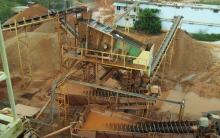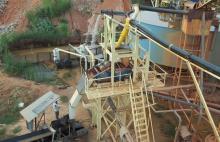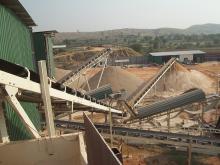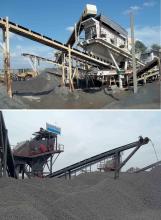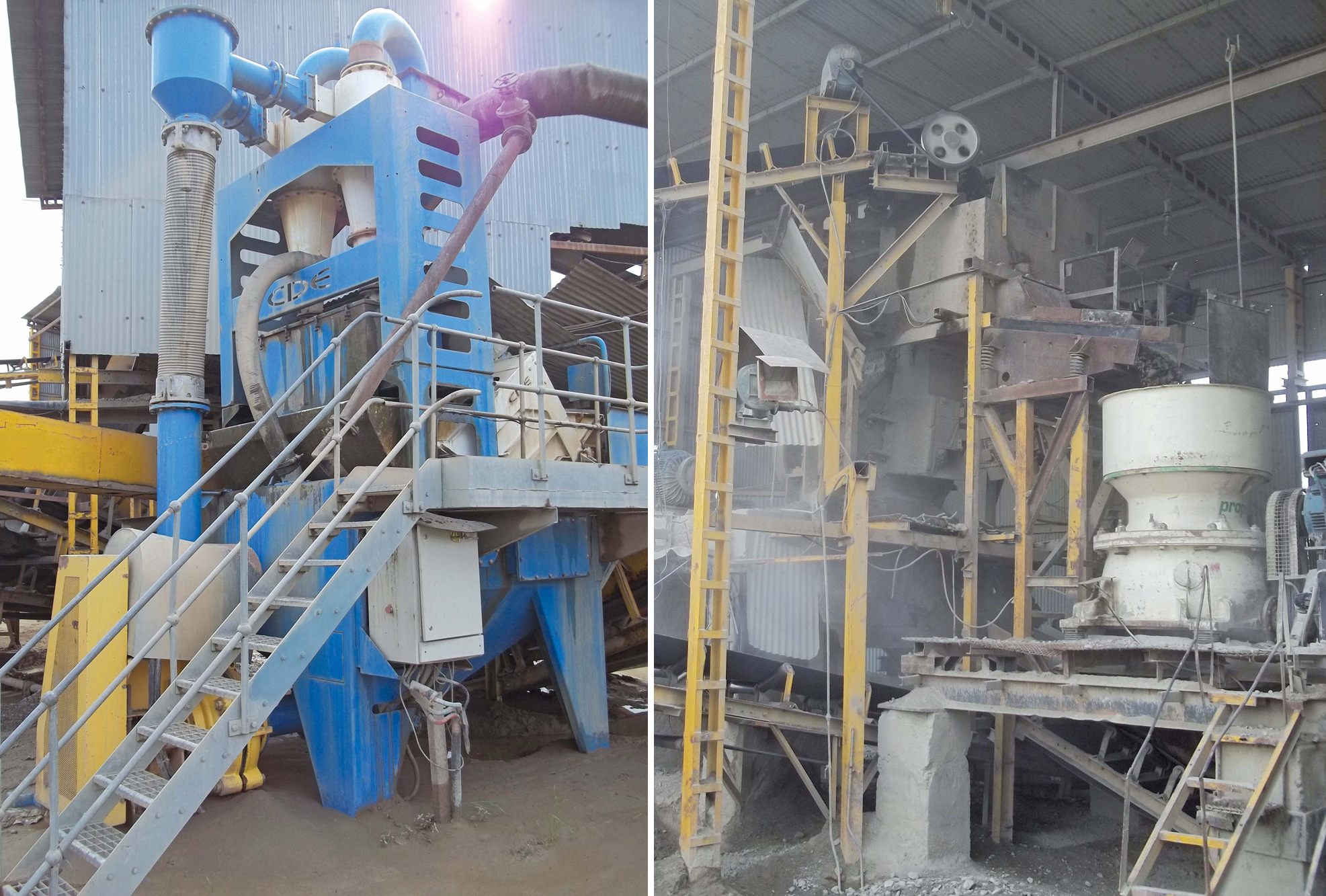
North India-based LSC Infratech is one of India’s earliest crushing plant owners. Ever since its inception, the company has been investing heavily in newer technologies, a strategy helping the company’s operational efficiency and profitability in the highly competitive Indian crushing business. With four crushing plants in the Indian state of Uttarkhand on the foothills of the picturesque Himalayan region, 255 kilometres away from India’s capital Delhi, and two plants in Rajasthan state, north India, LSC Infratech is one of the biggest fixed crushing plant owners in India, writes Partha Pratim Basistha.
After starting its operation in 1991, setting up a first plant in Haldwani, Uttarkhand with toggle jaw, roller and impact crushers, and buoyed by rapidly growing road and other infrastructure projects in north India, LSC Infratech expanded its business into other parts of UK, creating a second crushing plant at Bajpur in 2007. This was followed by Ajitpur and Kishanpur plants in 2010. The four plants in UK produce 4.5 million tonnes/year of crushed aggregates which includes 2 million tonnes/year of sand. The crushed aggregates and sand is often bought by infrastructure contractors in north India, covering the states of Uttarkhand (UK), Uttar Pradesh (UP), India’s capital state of Delhi and its National Capital Region covering bordering states of Haryana and UP mainly through roads. Railway ballast is transported through wagons rakes.
Riverbed boulders (RBM), the raw materials for the plants, are sourced from the nearby dry river beds during the non-monsoon period, usually spanning across six months through manual process. Hordes of labourers from UK and other parts of north and eastern India collect the RBM and load it on tipper and conventional bodied trucks for transporting to the crushing plants. A manual process is used, as the use of excavators or other mechanical equipment for extraction of RBM is prohibited by the state government.
“The rivers of UK are our natural source of raw materials and the natural source for many other small and medium crushing plant owners in the region. They are also the source of direct and indirect employment and business for almost three thousand tipper truck owners transporting the RBM to the plants here. They do this daily for six months, contributing to the prosperity of the region,” says Shiv Kumar Agarwal, chairman and managing director of LSC Infratech and the founder of the company.
Saurabh Agarwal, LSC’s director, adds: “The RBM gets deposited on the river beds, brought down by the heavy water current of numerous rivers originating from the hills in this region. The state government allows regular de-siltation of the river beds via crusher plant owners removing RBM every year during the non-monsoon months of January to May. The volumes of RBM to be extracted are decided by the state government following a survey of the rivers. Lack of periodical extraction would cause accumulation of RBM. This would restrict heavy flow of the river water during monsoon, causing heavy floods in the region.”
The state government permitted RBM extraction from River Gaula, one of the rivers in the region, of 4,377,901.05m³ in 2015. Removal of very big boulders is restricted in the river from the junction of the hilly and plain area, as they serve for dissipating energy of the flowing water. The permissible levels of extraction are based on assessment by the Indian Institute of Soil & Water Conservation UK.
RBM for LSC’s Haldwani plant is sourced from River Gaula; from River Dabka for Bajpur crushing plant; from River Nandhaur for Ajitpur plant; and from River Kosi in UK for the Kishanpur plant.
Each of LSC’s four UK plants produce 6,000tonnes/day of material, out of an achievable capacity of 8,000tonnes/day. The plants have an installed capacity of 500tonnes/hour. To have higher and diversified production volumes, and thus better margins, in the highly competitive Indian crushing aggregates business, LSC has configured its crushing units to produce aggregates of various sizes including 5-8 mm, 8-17mm, 14-22mm, 35-42mm, 42-65mm and 65-90mm, mainly for new road projects. Fifty percent of its crushed aggregates are taken by the road construction sector, 30% for infrastructure and the real estate sector, 10% by the ready-mixed concrete industry, and the remaining 10% by the railways.
“The volumes for railway ballast have been going up in recent years, owing to a doubling of rail routes and creating newer railway corridors in North India and other parts of the country.” says Saurabh Agarwal.
The configuration of each of the four fixed LSC plants comprise jaw, screen, cone and washing systems. Each crushing plant has between two to four jaw crushers of 150tonnes/hour from Delhi-based CCM Ostem Projects and
There are two B-series 150tonnes/hour CDE washing plants, one each at Ajitpur and Bajpur, and two C-series 75tonnes/hour CDE washing plants at Haldwani and Kishanpur. Saurabh Agarwal says: “I have been the first customer of these
Of the rationale behind all LSC’s UK plant equipment purchases, Saurabh Agarwal says: “Owing to the hard and abrasive stones to be crushed, we required equipment with long life based on minimal components wear. We started manufacturing our own three-four deck screens in the company’s initial years, since there were negligible screen manufacturers in India to meet our desired quality specifications. In 1996 we entered into an association with the Indian Institute of Technology, in Roorkee, UK, to gain expertise in water recycling from sand washing. Most importantly, we have placed strong emphasis on training freshers recruited from the Indian Industrial Training Institute. As we move towards adoption of newer technologies, we are continuously training between 20 and 30 personnel every year.”
He adds, “We yearn for continuous improvements in efficiency of our plants. Hence, we are always open towards acquiring newer equipment and experimenting with them. This has provided an ideal opportunity for Indian and foreign OEMs to deploy equipment at our plants for trials. The partnerships with OEMs have been benefitting us as we have been able to use the technologically improved equipment following trials aimed at meeting our requirements. One of the major achievements of this association is that it has allowed us to incorporate efficient running of our plants over the years.”
The colossal volumes of RBM, crushed aggregates and sand are handled by a large fleet of LSC’s own equipment at its UK plant sites. Between them, the UK sites have seven units of
LOADING
7 x Volvo EC 210 crawler excavators
3x L&T Komatsu PC 210 crawler excavators
3x L&T Komatsu PC 300 crawler excavators
2x JCB JS 220 tracked excavators
14x LiuGong CLG 856 wheeled loaders
2x Liugong ZL 30 wheeled loaders
4x Telcon-Hitachi TWL 3034 wheeled loaders
7x Hindustan 3tonne wheeled loaders
HAULING
13x Ashok Leyland’s new range of U- 2523 tipper trucks
2x Ashok Leyland U-2516 tipper trucks
2x Ashok Leyland U-3123 tipper trucks
CRUSHING
2-4 jaw crushers of 150t/h in each plant from Delhi-based CCM Ostem and Terex MPS
1x Terex MPS 42AY 1410 jaw crusher
2x Propel 220t/h cone crusher
3x Terex MPS 220t/h cone crusher
1x Propel 350t/h cone crusher
SCREENING
5-6x stationery four to three decks screens from Propel, Terex MPS and LSC
WASHING
2x CDE B-series 150t/h washing plants
2x CDE C- series 75t/h washing plants
LSC is in the process of acquiring an additional two excavators, three wheeled loaders, and ten tipper trucks to work with its soon to be opened new, and fifth overall in UK, 500tonnes/hour crushing plant. The plant will be similarly configured to the existing UK plants comprising two cones, five screens and three jaw crushers. “We will be acquiring equipment from the OEM’s providing best package in terms of pricing and prompt parts support.” says Saurabh Agarwal.
Sushil Chauhan, head of operations & maintenance at LSC Infratech, says that due to ever rising pressure on margins, LSC was concentrating on reducing operating costs. “We usually look to replace equipment or keep them only on standby mode if it is more than three years old. This is actually when the warranty period of the equipment comes to an end. Timely replacement of equipment minimises the chance of breakdown.”
Since all material handling equipment at the four UK plants operates for 300 days, 12-15 hours a day, equipment reliability, lower maintenance and optimum performance, supported by appropriate product support, is vital for LSC. “Getting timely product support for plant operators like us handling large quantities is crucial. Equipment failure can severely disrupt our entire production chain. For this, we prefer manufacturers who have an established manufacturing facility and a marketing, sales and support network in India. We selected LiuGong for the same reason, as it has an established manufacturing facility at Indore in central India backed by an elaborate warehouse. We have taken a similar approach towards selecting OEM’s for our processing plants.” says Saurabh Agarwal.
To minimise fuel costs, LSC acquired four Telcon Hitachi hydrostatic wheeled loaders in 2013. It plans to purchase three additional new units. Saurabh Agarwal says: “We have carefully studied the operating features of the loaders before purchasing them.” He continues: “The [Telcon Hitachi] loaders’ hydrostatic drive functions both as clutch and transmission, eliminating clutch and transmission related losses, resulting in high levels of fuel efficiency.” Hydrostatic drive technology uses fluid under pressure to transmit engine power to drive the wheels.
For optimum operation of each of the current four LSC UK plants, including effective management of their machine fleets, LSC has put in place ERP software to monitor equipment. Of LSC’s efforts to maximise equipment availability, Chauhan says managers at each of the company’s four UK plants have an elaborate checklist of the components that may need to be repaired or replaced. There are daily, weekly or annual maintenance checks, depending on the component type, with any necessary repairs carried out in-house at an integrated workshop within each of the four UK plants. The workshops boast inspection bays and engine overhaul facilities.
All LSC’s future UK and other Indian state crushing plants will also have integrated workshops, with facilities similar to the existing UK plants.

